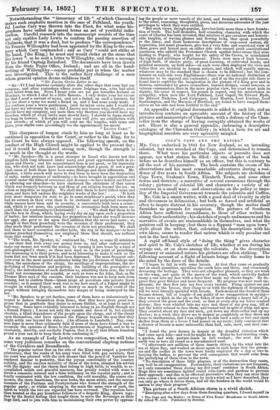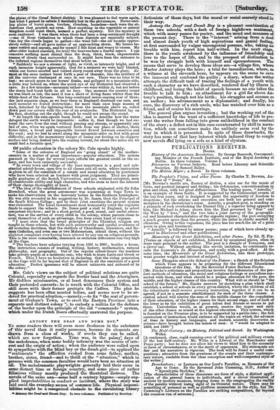COLE'S CAPE AND THE ICA.FIRS..
Ma. COLE embarked in 1841 for New Zealand, as an intending colonist, but was wrecked at the Cape, and determined to remain there. What were his particular objects or pursuits does not appear, nor what station he filled : in one chapter of the book before us he describes himself as an officer, but this is contrary to all the rest of his narrative. The book contains the cream of his observations and his most remarkable adventures during a resi- dence of five years in South Africa. The subjects are sketches of Cape Town, Graham's Town, Elizabeth Town, and some other towns and districts ; a narrative of several excursions through the colony ; pictures of colonial life and character; a variety of ad- ventures in a small way ; and observations on the policy or impo- licy of the Imperial Government towards the colonists and Caffree. Mr. Cole ia a smart writer, with 'a good deal of vivacity in style and cleverness in delineation ; but both so forced and artificial as often to inspire distrust in his accuracy, though the matter itself furnishes no grounds for suspicion. His pictures of Southern Africa have sufficient resemblanee,,to those of other writers to stamp their authenticity ; his sketches of people andmanners and his narrative of events are vraisemblable in themselves, and what the painters call in keeping ; but there is a flippant " man upon town" style about the writer, that, colouring his descriptions with his own ideas, seems to render that untrue which is only peculiar and not in the best taste.
A rapid off-hand style of " doing the thing" gives character and spirit to Mr. Cole's sketches of life, whether at sea during his voyage out, or on shore among the colonists. In the description of scenery or animated nature his pictures are often striking. The following account of a flight of locusts brings the reality home to the mind by the force of the details.
"I began to fall in with some locusts. At first they came on gradually and in small quantities, speckling the earth here and there, and voraciously devouring the herbage. They were not altogether pleasant, as they are weak on the wing, and quite at the mercy of the wind, which uncivilly dashed i many a one into my face with a force that made my cheeks tingle. By de- grees they grew thicker and more frequent. My progress was now most un- pleasant, for they flew into my face every instant. Flung against me and my horse by the breeze, they clung to us with the tightness of desperation, till we were literally speckled with locusts. Each moment the clouds of them
became denser, till at length—I am guilty of no exaggeration in saying—
they were as thick in the air as the flakes of snow during a heavy fall of it they covered the grass and the road, so that at every step my horse crushed dozens ; they were whirled into my eyes and those of my poor nag, till at last the latter refused to face them, and turned tail in spite of whip and spur. They crawled about my face and neck, got down my shirt-collar and up my
sleeves; in a word, they drove me to despair as completely as they drove my horse to stubbornness, and I was obliged to ride back a mile or two and claim shelter from them at a house I had passed on my route ; fully convinced that a shower of locusts is more unbearable than hail, rain, snow, and sleet com- bined.
"I found the poor farmer in despair at the dreadful visitation which had come upon him—and well he might be so. Today he had standing crops, a garden, and wide pasture-lands in full verdure ; the next day the earth was as bare all round as a macadamized road.
"I afterwards saw millions of these insects driven by the wind into the sea at Algoa Bay, and washed on shore again in such heaps that the prison- ers and the coolies in the town were busily employed for a day or two in burying the bodies, to prevent the evil consequence that would arise from the putrefying of them close to the town. "No description of these little plagues, or of the destruction they cause, can well be an exaggeration. Fortunately, their visitations are not frequent, as I only remember three during my five years' residence in South Aide*. Huge fires are sometimes lighted round corn-lands and gardens to prevent their approach : and this is an effectual preventive when they can steer their own course ; but when carried away by such a wind as I have described, they can only go where it drives them, and all the bonfires in the world would be useless to stay their progress."
This picture of a South African storm is a vivid sketch.
"Emerging after a few days from these freezing quarters, I found myself its
• The Cape and the Kars; or Notes of Five Years' Residence in South Africa. By Alfred W. Cole. Published by Bentley. the plains of the Graaf Reinet district. It was pleasant to feel warm again, but what I gained in caloric I decidedly lost in the picturesque. Never-end- ing plains of burnt grass, treeless, nverleas, houseless—such were the at- tractions that greeted my eyes. How anything in the vegetable or animal kingdom could exist there, seemed a perfect mystery. Tet the mystery is soon explained. I was there when there had been a long-continued drought —one of those visitations to which these districts are especially subject. One day the clouds began to gather—the wind fell—the air became oppres- sively sultry—and all gave notice of an approaching storm. My horses be- came restive and uneasy, and for myself I felt faint and weary to excess. My after-rider looked alarmed, for truly the heavens bore a fearful aspect. I can conceive nothing more dismal than the deep, thick, black, impenetrable masses of clouds that surrounded us. It might have been the entrance to the infernal regions themselves that stood before us. " Suddenly we saw a stream of light, so vivid, so intensely bright, and of such immense height apparently, that for a moment we were half blinded, while our horses snorted and turned sharp round away from the glare. Al- most at the same instant burst forth a peal of thunder, like the artillery of all the universe discharged at once in our ears. There was no time to be lest: we struck spurs to our horses' flanks, and galloped to a mountain-side, a little way behind us, where the quick eye of my Hottentot had observed a cave. In a few minutes—moments rather—we were within it, but not before the storm had burst forth in all its fury. One moment the country round us was black as ink, the next it was a sheet of living flame whiter than the white-heat of the furnace. One long-continued never-ceasing roar of thun- der (not separate claps, as we hear them in England) deafened our ears, and each moment we feared destruction • for more than once huge masses of rock, detached by the lightning-blast from the mountain above us, rolled down past our cavern with the roar of an avalanche. The Hottentot lay on bit face, shutting out the sight, though he could not escape the sound.
" At length the rain-spouts burst forth ; and to describe how the water deluged the earth would be impossible : suffice it, that though we had en- tered the cave from the road without passing any stream, or apparently any bed of one, when we again ventured forth from our place of shelter, three hours later, a broad and impassable torrent flowed between ourselves and the road ; and we bad to crawl.along the mountain-sides on foot with great difficulty, and in the momentary danger of losing our footing on its slippery surface and being dashed into the roaring torrent, for about two miles ere we could find a fordable spot."
Of public education in the- colony Mr. Cole speaks highly. "-Some of the colonies of England are ' going ahead' of the mother- ommtry in a matter of great importance—popular education. The system pursued at the Cape for several years refleota the greatest credit on the co- (oily, and has been eminently successful.
" In every town and village of the least importance is a good and sub- stantial school-house, open free to all classes and all sects, where instruction is given in all the essentials of a simple and sound education by gentlemen who have been selected as teachers with great judgment. They are princi- pally graduates of the Scotch Universities, and are, without exception, men of considerable ability and high character, and who seem to have the interest of their charge thoroughly at heart. " The idea of the establishment of these schools originated with Sir John Eferschell, when the great astronomer was sojourning at Cape Town to snake his observations on the heavenly bodies in the Southern hemisphere. He was ably seconded in his suggestions by Dr. Lines, then the Principal of j
the South African College ; and by their oint exertions the present system was elaborated. The Local Government moat honourably voted the requisite funds to support the schools. Dr. Rams paid a visit to England, to select competent teachers ; and in a short period, a good, sound, and useful educa- tion, was at the service of every child in the colony, whose parents chose to avail themselves of such an advantage, free from every kind of expense. " I must state that the broad principles of the Christian religion are taught in these schools, but with such praiseworthy and careful avoidance of all sectarian doctrines, that the children of Churchmen, Dissenters, and Ro- man Catholics, and even one or two Mahometans, attend them, without the slightest complaint ever having been uttered by any one on religious grounds. This is the more remarkable, inasmuch as sectarian differences run very high at the Cape. " The teachers have salaries varying from 1001. to 2001., besides a house. The instruction consists of reading, writing, history, mathematics, natural philosophy, and geography. Out of the regular sohool-hours the teachers take private pupils at a moderate rate, who wish to learn Latin and Greek or French. Thus I have no hesitation in declaring, that the rising generation at the Cape will be far beyond that of England in all the essentials of a good education. Perfect ignorance will be almost unknown and unheard-of in the colony."
Mr. Cole's views on the subject of political relations are quite Colonial, especially as regards the Border land and the Aborigines. He dislikes missionaries, or at least denounces their system and
their pretended converts ; he is wroth with the Colonial Office, and still more with their former proteges the Caffres. The plan ho suggests has been often mooted before, and seems now to be or- dered for practical adoption,—namely,—to fix " the seat of govern- ment at Graham's Town, or to erect the Eastern Province into a separate and distinct colony "; to embody a militia for the defence of the border upon the principle of the old. " commando " system, which under the Dutch Boors effectually answered the purpose.



























 Previous page
Previous page